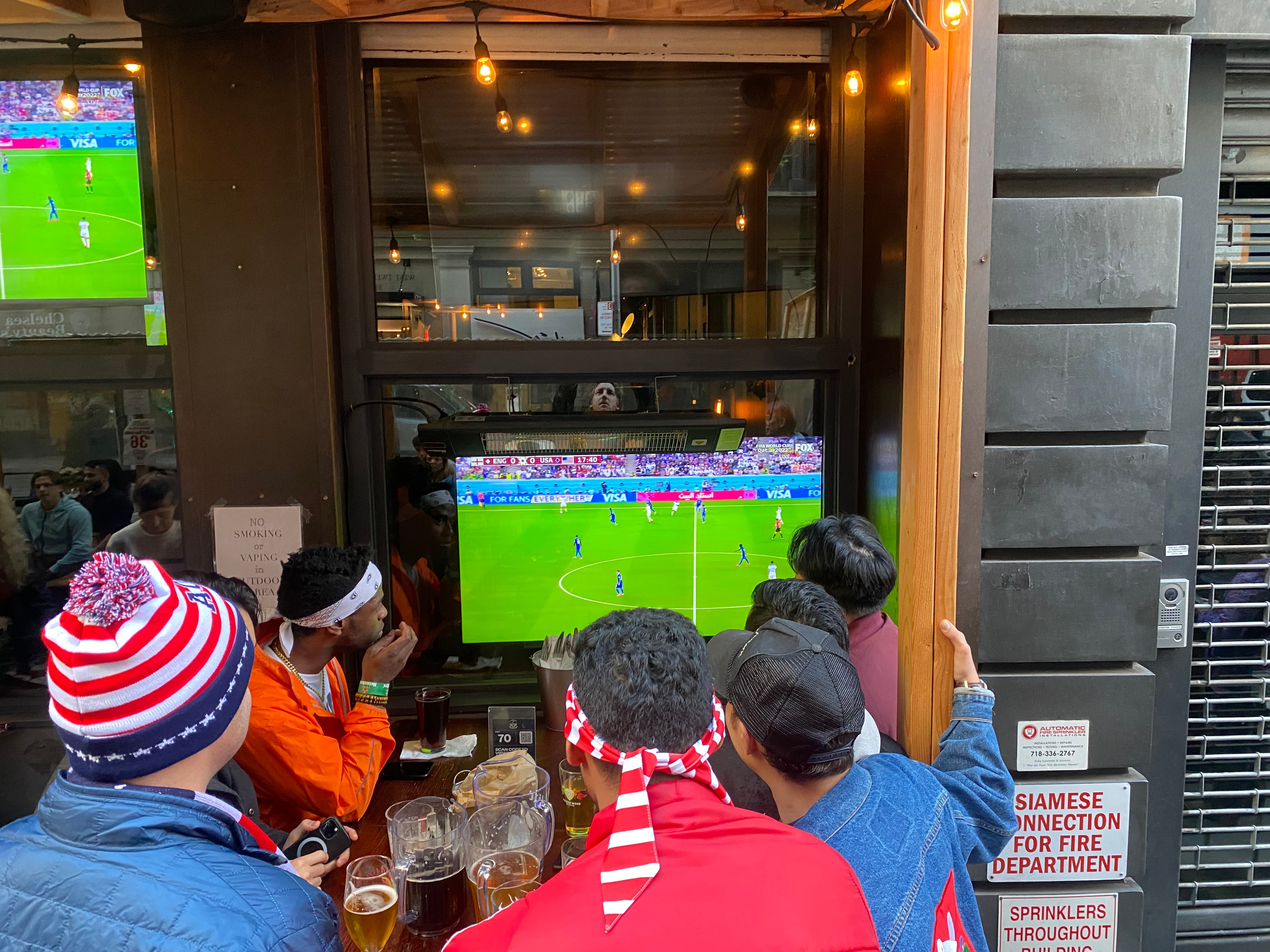Americans are falling in love with football and we should all be worried
Richard Hall watches the England-USA draw at a New York bar and is worried by what he sees

Your support helps us to tell the story
From reproductive rights to climate change to Big Tech, The Independent is on the ground when the story is developing. Whether it's investigating the financials of Elon Musk's pro-Trump PAC or producing our latest documentary, 'The A Word', which shines a light on the American women fighting for reproductive rights, we know how important it is to parse out the facts from the messaging.
At such a critical moment in US history, we need reporters on the ground. Your donation allows us to keep sending journalists to speak to both sides of the story.
The Independent is trusted by Americans across the entire political spectrum. And unlike many other quality news outlets, we choose not to lock Americans out of our reporting and analysis with paywalls. We believe quality journalism should be available to everyone, paid for by those who can afford it.
Your support makes all the difference.Watching Americans fall in love with football is like watching the fires of Mount Doom light up the dark sky over Mordor. Here in this New York bar, described by several online listicles as “the best soccer venue in the city”, I am Gandalf gazing at a pulsating orange glow in the distance with foreboding – a silent witness to the rise of a power that, once unleashed, will be almost impossible to stop.
It’s no secret that the United States is a country that takes sports very seriously, but it’s hard to describe to people who don’t live here just how deeply engrained it is in the culture. From a very early age, through high school and college, Americans are raised on a diet of several at once. Their sporting prowess isn’t immediately obvious to us from the outside because they are mostly content to play games that no one else does. But football, the most popular sport in the world, has been winning American hearts and minds at a rapid pace over the last decade.
As I watched England take on the US in the group stage of the World Cup, surrounded by American football fans, I was given pause to wonder: What happens when this nation of sporting fanatics finally starts taking this sport seriously?
I’m here to take the temperature, and perhaps deliver a warning to the rest of the world.
The atmosphere in the bar might have been indistinguishable from a London pub were it not for a few small differences. Confusingly, American football fans shout encouragement at their countrymen instead of swearing at them, as English fans are known to do. They chant simply “USA” rather than screaming detailed instructions to the professionals on the field. Even when inebriated, and even in defeat, American fans offer Ted Lasso-like platitudes instead of weeping into their weak beer.
Clearly, they have much to learn about the sport. But whether we like it or not, American football fans are growing in number. According to a 2019 Gallup poll, the number of people who said “soccer” was their favourite sport to watch grew sevenfold, albeit from a low starting point. Other polls suggest football has overtaken ice hockey in popularity here, and is snapping at the heels of America’s national pastime, baseball. The number of American players playing in top flight European teams has grown exponentially, too, which has heightened interest back home. And on a promising note for the future, soccer fans in the US tend to be younger and more diverse than other sports.

In 2026, the US will host the World Cup, setting the stage for a new generation of fans to learn and love the beautiful game.
Aaron Angeles, a 22-year-old New Yorker and lifelong soccer fan who is watching the game at the best soccer bar in the city, believes it’s only a matter of time before the United States starts to realise its potential in the global sport.
“The growth of American players in the Premier League and other European leagues is really a big sparking interest in American fans,” he says.
“As soccer has started to gain more traction, we’ve started to put out better prospects. Ten years ago our best player was maybe the third-best player at Fulham. Now we have players at Chelsea, Juventus – once we have the resources behind it, it’s going to be unfortunate for the rest of the world.”
Angeles describes the US team’s stunning victory over Ghana in the 2014 World Cup as a “core memory”, and believes a few more years of victories on the big stage will speed up.
“It all comes down to performance. If we beat a big team like England a lot could change, it could expedite the process of what’s been growing here for a few years.”
As the game progresses without a goal from either side, the number of Revolutionary War references among the spectators in the bar increases.
“Tea party that ass!” shouts one.
“Get it up the other end of the court!” says another.
One armchair analyst notes, as the game ends in a draw: “This was one of the weird times where a tie was a win.”
Immigrant communities have been driving much of the growth of football in the US, and it has the most diverse fanbase of any sport in the US. According to a recent survey by Morning Consult, 40 per cent of football fans are people of colour and more than 1 in 4 US adults who identified as soccer fans (27 per cent) were Hispanic.
“Our parents are Trinidadian so growing up we didn’t do a lot of the classic American sports, we did a lot of soccer. We played through high school,” says Gibran Boyce, 24, wearing the jersey of the US team, on her way to a bar to watch the game.
“It’s becoming more mainstream,” says her sister, 22-year-old Carina Boyce. “A lot of people like the camaraderie of the game, going out and drinking together.”
At the final whistle, a draw for the underdog American team felt like a victory. But many are already looking to the future.
Nico Bossey, another lifelong football fan, believes it won’t take long for US hegemony to rule over the sport. As more Americans become fans, more resources will be spent on development, and world domination will follow, he argues.
“You’re talking to someone who has been a soccer fan since they were little, but I’m seeing more and more people get into it who weren’t before,” said Bossey. “More kids will start playing soccer. A lot of sports are boring or expensive. A ball and some cleats and you’re good to go.
“This is a very young team. A tournament or two from now, you’ll see an establishment,” he says.
President Joe Biden, not known for being a big football fan, seemed pleased with the result, at least. While walking with his family in Nantucket, he was asked his response to the result.
“I’d rather it be one nothing but it’s good. England is tough,” he said.
Join our commenting forum
Join thought-provoking conversations, follow other Independent readers and see their replies
Comments